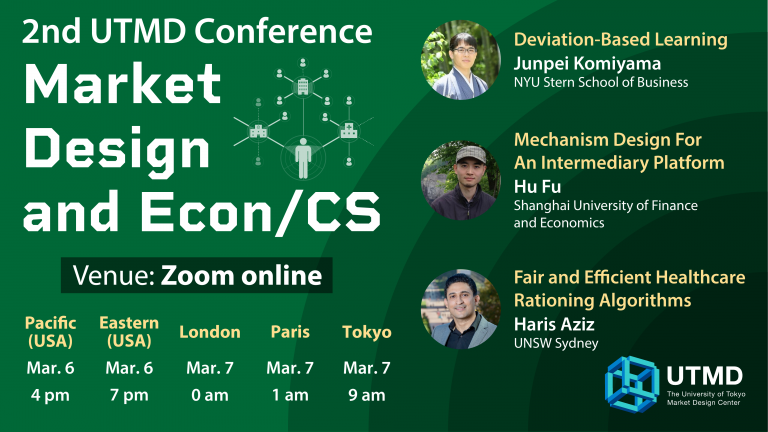8:55am-12:20pm(JST)
学生・研究者向け
2nd UTMD Conference: Market Design and Econ/CS

Workshop Information
Dates: March 7, 2022 8:55 am(JST)
Venue: Zoom online
Language: English
How to join: Please use the following link for registration.
Registration link
Format: Each talk is 1 hour: the speaker has 50 minutes, which is followed by a 10-minute general audience discussion.
Program
*All times shown below are Japan time.
| 8:55-9:00 | Opening remarks |
| 9:00-10:00 | Deviation-Based Learning We propose deviation-based learning, a new approach to training recommender systems. In the beginning, the recommender and rational users have different pieces of knowledge, and the recommender needs to learn the users’ knowledge to make better recommendations. The recommender learns users’ knowledge by observing whether each user followed or deviated from her recommendations. We show that learning frequently stalls if the recommender always recommends a choice: users tend to follow the recommendation blindly, and their choices do not reflect their knowledge. Social welfare and the learning rate are improved drastically if the recommender abstains from recommending a choice when she predicts that multiple arms will produce a similar payoff. |
| 10:10-11:10 | Mechanism Design For An Intermediary Platform Feldman et al. [2010] proposed a model for modern online advertisement market with mediating agencies, where a Demand-Side Platforms (DSP) acts as an intermediary that collects direct bids from a number of advertisers and then participates on their behalf as a single bidder on a central Ad Exchange (ADX). Such an intermediary profits from the difference between payments in the auctions, one it hosts, and the other it participates. We study the mechanism design problem for each individual intermediary DSP and the ADX. Bypassing complexities raised by Feldman et al., we characterize mechanisms and bidding strategies of a profit maximizing intermediary. We show that, regardless of the mechanism run by the ADX, a profit-maximizing DSP determines the contingent winner among its advertisers using the allocation rule of Myerson’s classical revenue optimal auction, and bids in the ADX’s auction as if having a value equal to the (ironed) virtual value of the contingently winning advertiser. The characterization immediately gives answers to mechanism design questions for the ADX, as well as markets with multiple layers of intermediaries. As consequences of this characterization, we show that, in contrast to classical auctions, the revenue of the ADX platform may decrease with stochastically higher values of an advertiser or with an extra advertiser. Also, sequential posted pricing may not approximate the optimal profit for an intermediary within any constant factor. To restore a connection between welfare and profit maximizing mechanisms a la Bulow and Klemperer, we show that, if the ADX runs the second price auction, a DSP running a welfare maximizing mechanism can approximate the optimal profit of a DSP with market share α∈[0,1] if the former has market share Ω(√α). We also show that advertisers are better off staying on a smaller intermediary platform than joining a bigger one. |
| 11:20-12:20 | Fair and Efficient Healthcare Rationing Algorithms Fair and efficient rationing of healthcare resources has emerged as an important issue that has been discussed by medical experts, policy-makers, and the general public. We consider a healthcare rationing problem where medical units are to be allocated to patients. Each unit is reserved for one of several categories and the categories may have different priorities for the patients. I discuss some recent work that I have been doing on healthcare rationing algorithms. One of the papers to be discussed is jointly written with Florian Brandl. |
| 12:20- | Closing remarks |
Organizers
Notes
- Please join via the link 5 minutes before the session starts.
- This workshop will be held in English only, no interpreter available.
- Please show your full name when you participate.
- Please mute your microphone during speaker’s talk except for Q&A session.
- No taking pictures, recording audio and video.
- This workshop will be recorded for the purpose of posting on our report/website. The name and faces of the participants may be displayed in the recording.
Contact info
The University of Tokyo Market Design Center(UTMD)
Graduate School of Economics, the University of Tokyo
E-mail: market-design@e.u-tokyo.ac.jp
Phone: (+81)3-5841-3441

